Personal Views On Teaching And Learning
VerifiedAdded on 2023/03/20
|9
|2637
|98
AI Summary
This study has focused on my own personal views regarding learning and teaching approaches and practices as a parent. For that reason, two learning theories have been chosen namely Cognitive Development Theory, propounded by Piaget and Operant Conditioning theory, originated by Skinner. For that reason, educational application of these theories has been discussed in this study along with a critical review of both of these theories including the imitations of both the theories. Furthermore, I have included my own experiences of applying the theoretical approaches in my parenting. For that purpose, I have come up with a new learning theory as per my requirements as a parent. This is because I happen to be a parent of two kids including one 4 year old child and a one year old child. Moreover, an evidence of my growth as a parent has been mentioned here in this study.
Contribute Materials
Your contribution can guide someone’s learning journey. Share your
documents today.
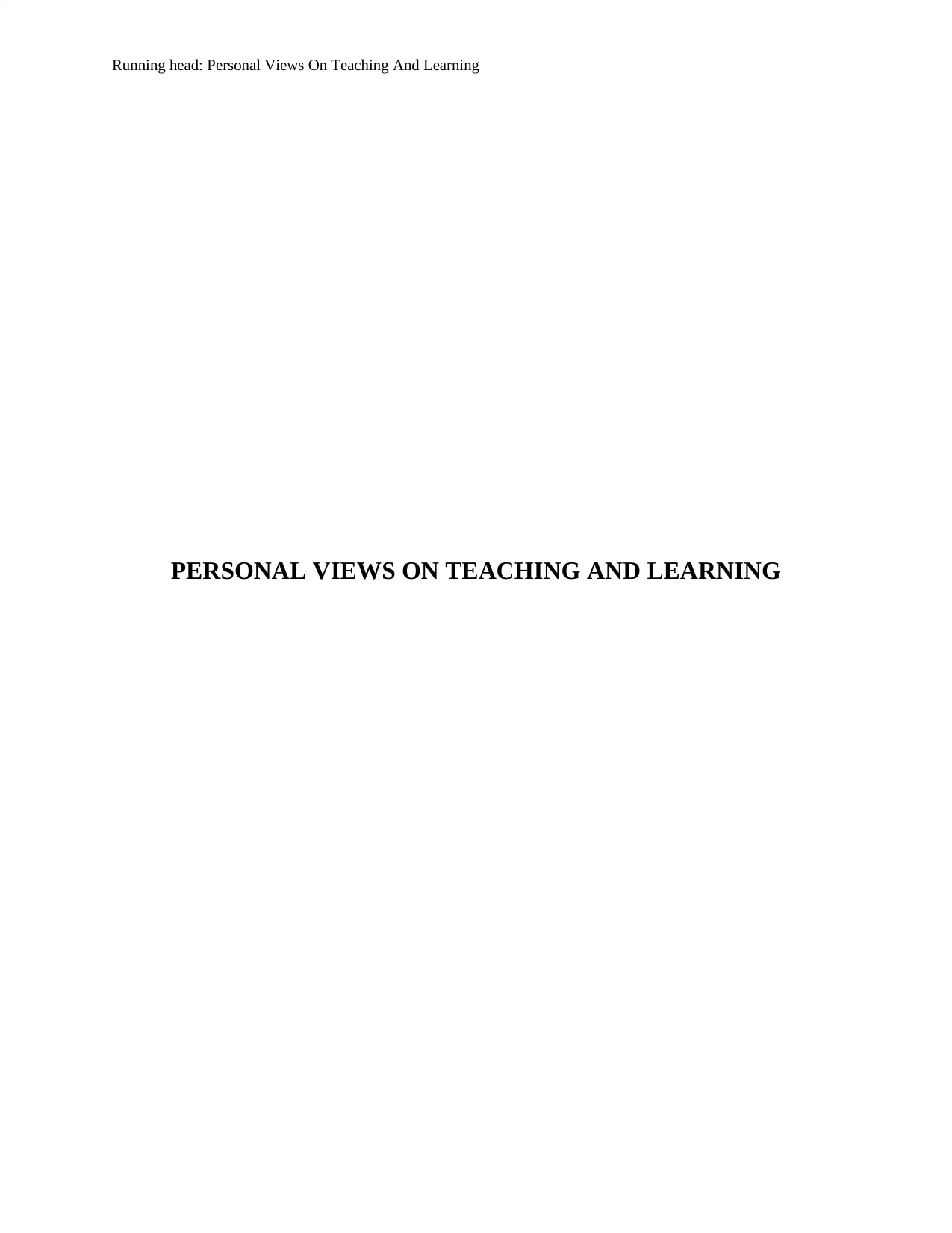
Running head: Personal Views On Teaching And Learning
PERSONAL VIEWS ON TEACHING AND LEARNING
PERSONAL VIEWS ON TEACHING AND LEARNING
Secure Best Marks with AI Grader
Need help grading? Try our AI Grader for instant feedback on your assignments.
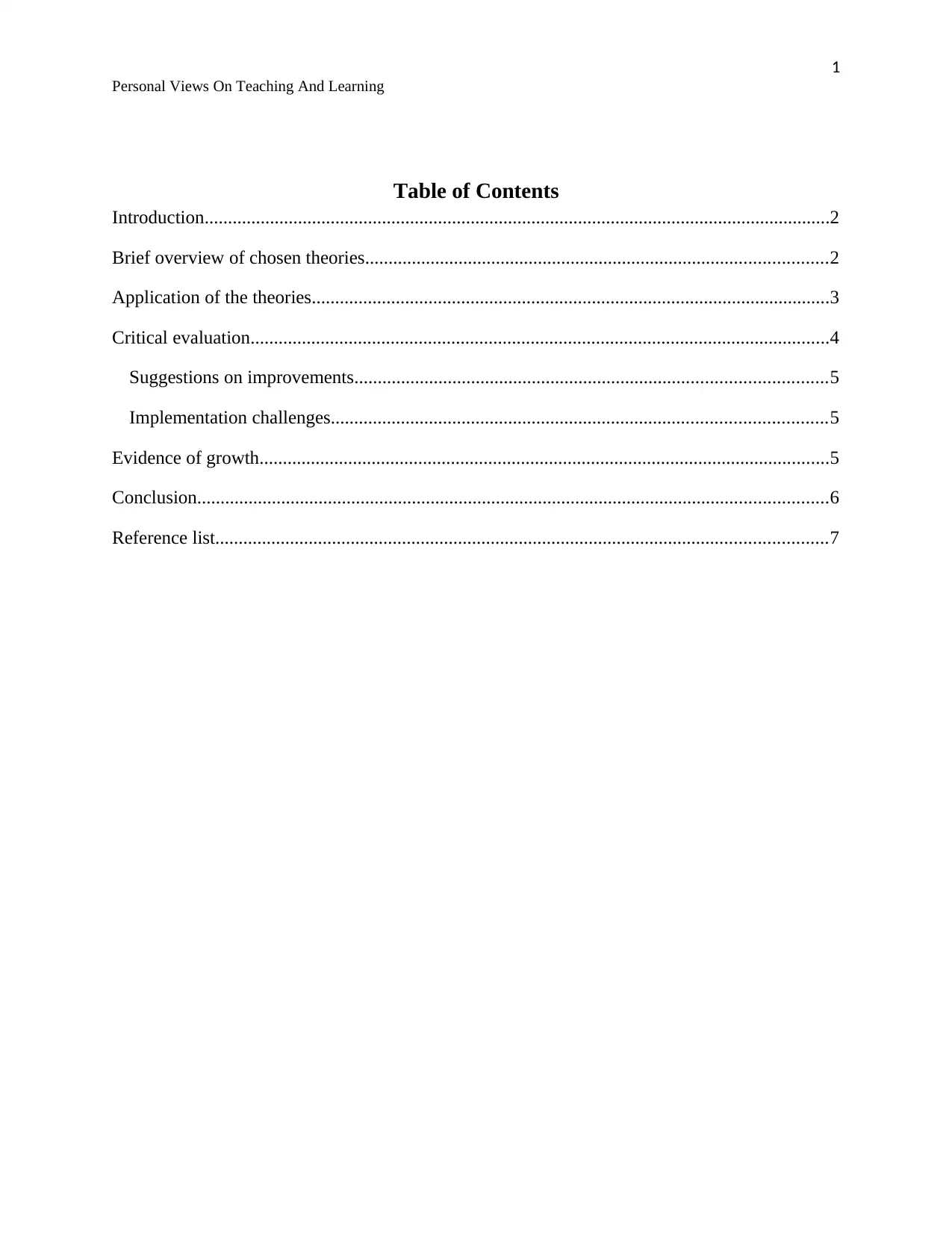
1
Personal Views On Teaching And Learning
Table of Contents
Introduction......................................................................................................................................2
Brief overview of chosen theories...................................................................................................2
Application of the theories...............................................................................................................3
Critical evaluation............................................................................................................................4
Suggestions on improvements.....................................................................................................5
Implementation challenges..........................................................................................................5
Evidence of growth..........................................................................................................................5
Conclusion.......................................................................................................................................6
Reference list...................................................................................................................................7
Personal Views On Teaching And Learning
Table of Contents
Introduction......................................................................................................................................2
Brief overview of chosen theories...................................................................................................2
Application of the theories...............................................................................................................3
Critical evaluation............................................................................................................................4
Suggestions on improvements.....................................................................................................5
Implementation challenges..........................................................................................................5
Evidence of growth..........................................................................................................................5
Conclusion.......................................................................................................................................6
Reference list...................................................................................................................................7
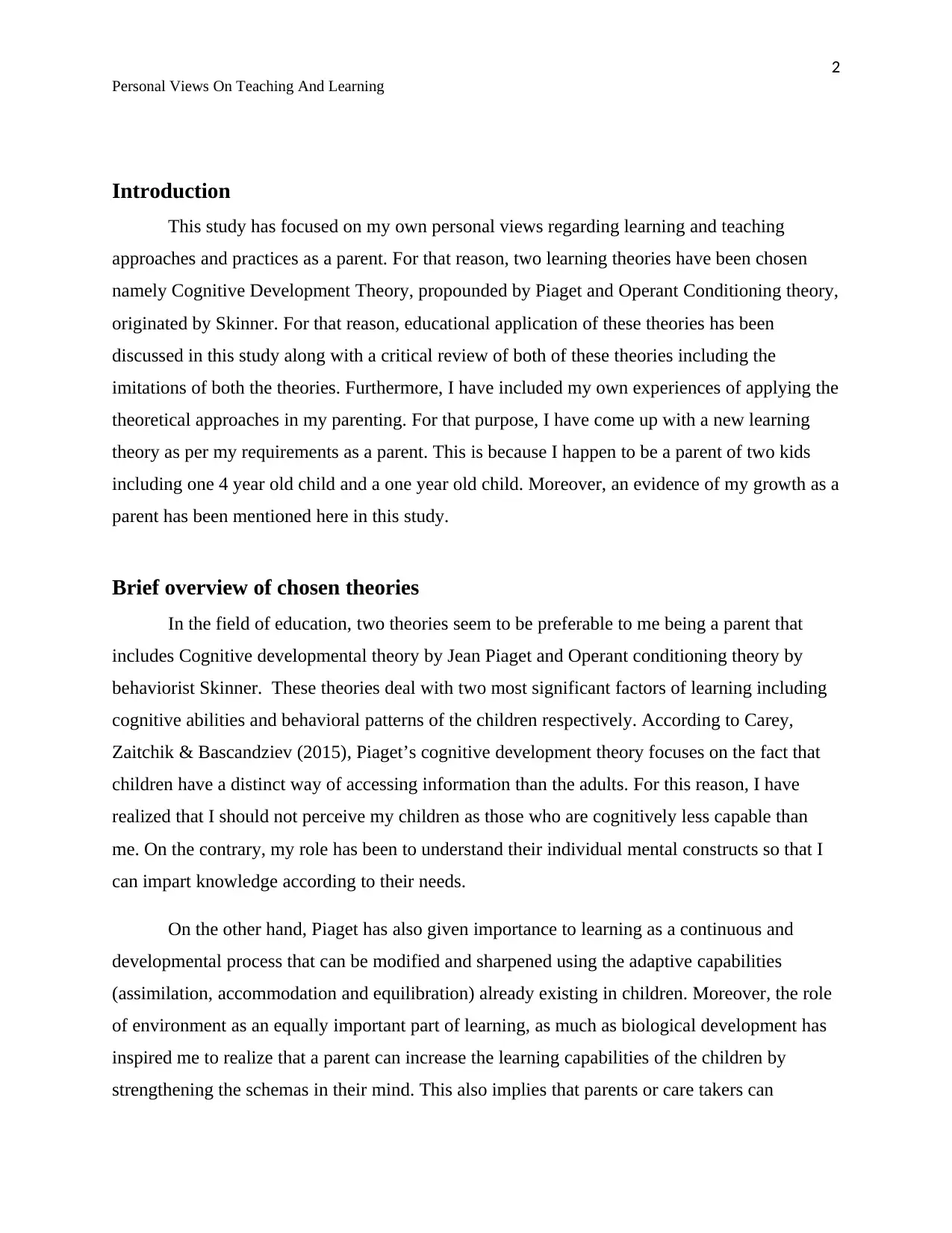
2
Personal Views On Teaching And Learning
Introduction
This study has focused on my own personal views regarding learning and teaching
approaches and practices as a parent. For that reason, two learning theories have been chosen
namely Cognitive Development Theory, propounded by Piaget and Operant Conditioning theory,
originated by Skinner. For that reason, educational application of these theories has been
discussed in this study along with a critical review of both of these theories including the
imitations of both the theories. Furthermore, I have included my own experiences of applying the
theoretical approaches in my parenting. For that purpose, I have come up with a new learning
theory as per my requirements as a parent. This is because I happen to be a parent of two kids
including one 4 year old child and a one year old child. Moreover, an evidence of my growth as a
parent has been mentioned here in this study.
Brief overview of chosen theories
In the field of education, two theories seem to be preferable to me being a parent that
includes Cognitive developmental theory by Jean Piaget and Operant conditioning theory by
behaviorist Skinner. These theories deal with two most significant factors of learning including
cognitive abilities and behavioral patterns of the children respectively. According to Carey,
Zaitchik & Bascandziev (2015), Piaget’s cognitive development theory focuses on the fact that
children have a distinct way of accessing information than the adults. For this reason, I have
realized that I should not perceive my children as those who are cognitively less capable than
me. On the contrary, my role has been to understand their individual mental constructs so that I
can impart knowledge according to their needs.
On the other hand, Piaget has also given importance to learning as a continuous and
developmental process that can be modified and sharpened using the adaptive capabilities
(assimilation, accommodation and equilibration) already existing in children. Moreover, the role
of environment as an equally important part of learning, as much as biological development has
inspired me to realize that a parent can increase the learning capabilities of the children by
strengthening the schemas in their mind. This also implies that parents or care takers can
Personal Views On Teaching And Learning
Introduction
This study has focused on my own personal views regarding learning and teaching
approaches and practices as a parent. For that reason, two learning theories have been chosen
namely Cognitive Development Theory, propounded by Piaget and Operant Conditioning theory,
originated by Skinner. For that reason, educational application of these theories has been
discussed in this study along with a critical review of both of these theories including the
imitations of both the theories. Furthermore, I have included my own experiences of applying the
theoretical approaches in my parenting. For that purpose, I have come up with a new learning
theory as per my requirements as a parent. This is because I happen to be a parent of two kids
including one 4 year old child and a one year old child. Moreover, an evidence of my growth as a
parent has been mentioned here in this study.
Brief overview of chosen theories
In the field of education, two theories seem to be preferable to me being a parent that
includes Cognitive developmental theory by Jean Piaget and Operant conditioning theory by
behaviorist Skinner. These theories deal with two most significant factors of learning including
cognitive abilities and behavioral patterns of the children respectively. According to Carey,
Zaitchik & Bascandziev (2015), Piaget’s cognitive development theory focuses on the fact that
children have a distinct way of accessing information than the adults. For this reason, I have
realized that I should not perceive my children as those who are cognitively less capable than
me. On the contrary, my role has been to understand their individual mental constructs so that I
can impart knowledge according to their needs.
On the other hand, Piaget has also given importance to learning as a continuous and
developmental process that can be modified and sharpened using the adaptive capabilities
(assimilation, accommodation and equilibration) already existing in children. Moreover, the role
of environment as an equally important part of learning, as much as biological development has
inspired me to realize that a parent can increase the learning capabilities of the children by
strengthening the schemas in their mind. This also implies that parents or care takers can
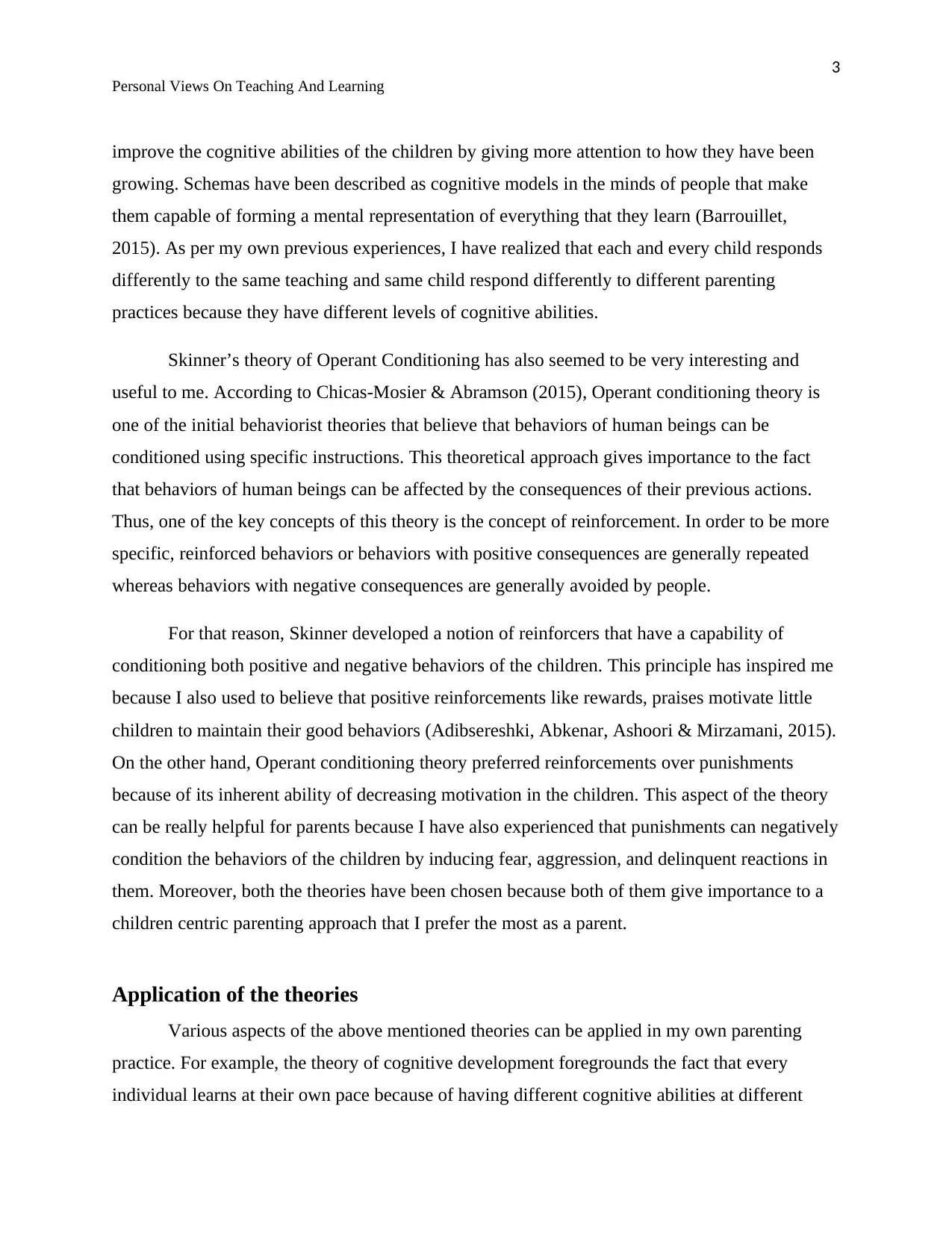
3
Personal Views On Teaching And Learning
improve the cognitive abilities of the children by giving more attention to how they have been
growing. Schemas have been described as cognitive models in the minds of people that make
them capable of forming a mental representation of everything that they learn (Barrouillet,
2015). As per my own previous experiences, I have realized that each and every child responds
differently to the same teaching and same child respond differently to different parenting
practices because they have different levels of cognitive abilities.
Skinner’s theory of Operant Conditioning has also seemed to be very interesting and
useful to me. According to Chicas-Mosier & Abramson (2015), Operant conditioning theory is
one of the initial behaviorist theories that believe that behaviors of human beings can be
conditioned using specific instructions. This theoretical approach gives importance to the fact
that behaviors of human beings can be affected by the consequences of their previous actions.
Thus, one of the key concepts of this theory is the concept of reinforcement. In order to be more
specific, reinforced behaviors or behaviors with positive consequences are generally repeated
whereas behaviors with negative consequences are generally avoided by people.
For that reason, Skinner developed a notion of reinforcers that have a capability of
conditioning both positive and negative behaviors of the children. This principle has inspired me
because I also used to believe that positive reinforcements like rewards, praises motivate little
children to maintain their good behaviors (Adibsereshki, Abkenar, Ashoori & Mirzamani, 2015).
On the other hand, Operant conditioning theory preferred reinforcements over punishments
because of its inherent ability of decreasing motivation in the children. This aspect of the theory
can be really helpful for parents because I have also experienced that punishments can negatively
condition the behaviors of the children by inducing fear, aggression, and delinquent reactions in
them. Moreover, both the theories have been chosen because both of them give importance to a
children centric parenting approach that I prefer the most as a parent.
Application of the theories
Various aspects of the above mentioned theories can be applied in my own parenting
practice. For example, the theory of cognitive development foregrounds the fact that every
individual learns at their own pace because of having different cognitive abilities at different
Personal Views On Teaching And Learning
improve the cognitive abilities of the children by giving more attention to how they have been
growing. Schemas have been described as cognitive models in the minds of people that make
them capable of forming a mental representation of everything that they learn (Barrouillet,
2015). As per my own previous experiences, I have realized that each and every child responds
differently to the same teaching and same child respond differently to different parenting
practices because they have different levels of cognitive abilities.
Skinner’s theory of Operant Conditioning has also seemed to be very interesting and
useful to me. According to Chicas-Mosier & Abramson (2015), Operant conditioning theory is
one of the initial behaviorist theories that believe that behaviors of human beings can be
conditioned using specific instructions. This theoretical approach gives importance to the fact
that behaviors of human beings can be affected by the consequences of their previous actions.
Thus, one of the key concepts of this theory is the concept of reinforcement. In order to be more
specific, reinforced behaviors or behaviors with positive consequences are generally repeated
whereas behaviors with negative consequences are generally avoided by people.
For that reason, Skinner developed a notion of reinforcers that have a capability of
conditioning both positive and negative behaviors of the children. This principle has inspired me
because I also used to believe that positive reinforcements like rewards, praises motivate little
children to maintain their good behaviors (Adibsereshki, Abkenar, Ashoori & Mirzamani, 2015).
On the other hand, Operant conditioning theory preferred reinforcements over punishments
because of its inherent ability of decreasing motivation in the children. This aspect of the theory
can be really helpful for parents because I have also experienced that punishments can negatively
condition the behaviors of the children by inducing fear, aggression, and delinquent reactions in
them. Moreover, both the theories have been chosen because both of them give importance to a
children centric parenting approach that I prefer the most as a parent.
Application of the theories
Various aspects of the above mentioned theories can be applied in my own parenting
practice. For example, the theory of cognitive development foregrounds the fact that every
individual learns at their own pace because of having different cognitive abilities at different
Secure Best Marks with AI Grader
Need help grading? Try our AI Grader for instant feedback on your assignments.
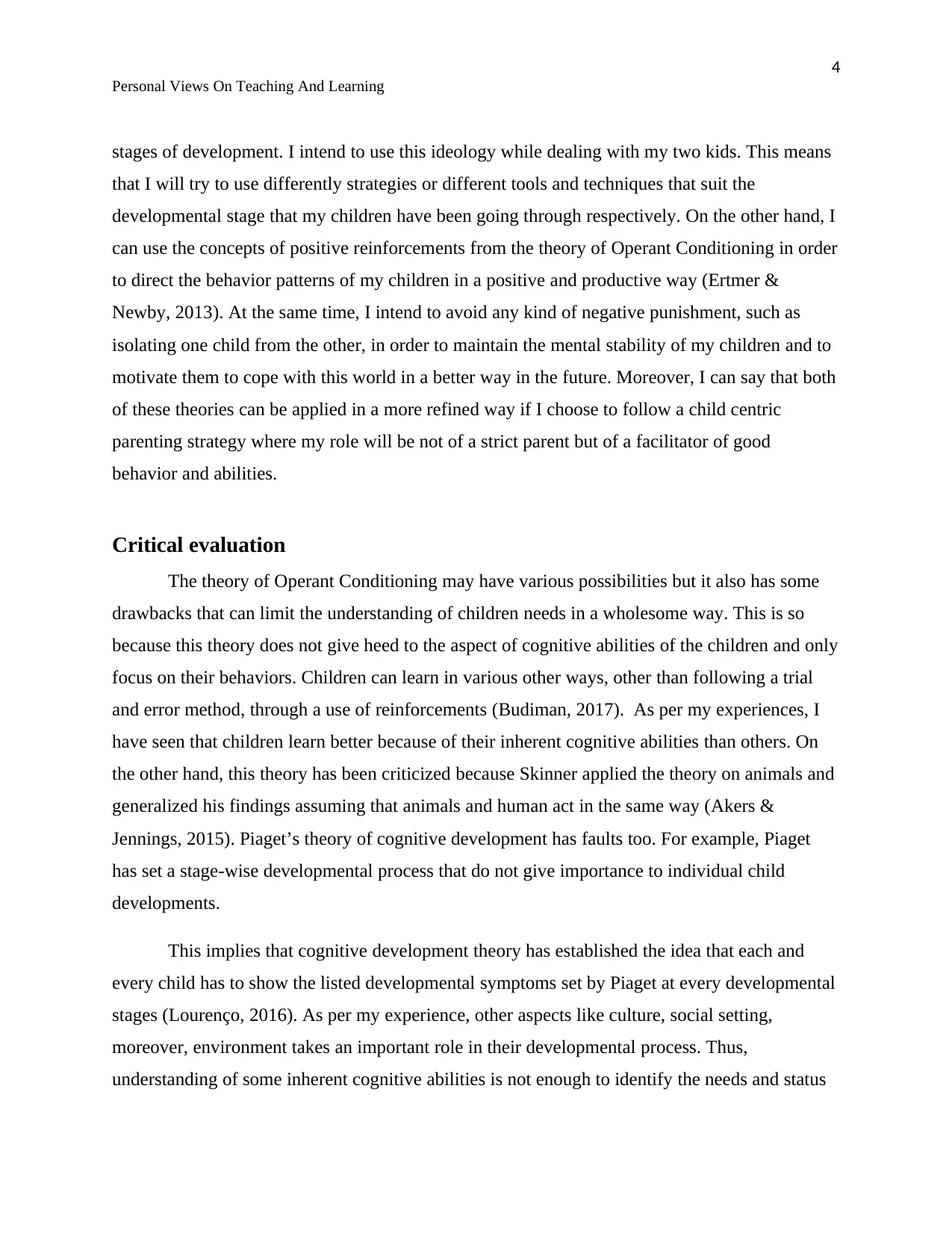
4
Personal Views On Teaching And Learning
stages of development. I intend to use this ideology while dealing with my two kids. This means
that I will try to use differently strategies or different tools and techniques that suit the
developmental stage that my children have been going through respectively. On the other hand, I
can use the concepts of positive reinforcements from the theory of Operant Conditioning in order
to direct the behavior patterns of my children in a positive and productive way (Ertmer &
Newby, 2013). At the same time, I intend to avoid any kind of negative punishment, such as
isolating one child from the other, in order to maintain the mental stability of my children and to
motivate them to cope with this world in a better way in the future. Moreover, I can say that both
of these theories can be applied in a more refined way if I choose to follow a child centric
parenting strategy where my role will be not of a strict parent but of a facilitator of good
behavior and abilities.
Critical evaluation
The theory of Operant Conditioning may have various possibilities but it also has some
drawbacks that can limit the understanding of children needs in a wholesome way. This is so
because this theory does not give heed to the aspect of cognitive abilities of the children and only
focus on their behaviors. Children can learn in various other ways, other than following a trial
and error method, through a use of reinforcements (Budiman, 2017). As per my experiences, I
have seen that children learn better because of their inherent cognitive abilities than others. On
the other hand, this theory has been criticized because Skinner applied the theory on animals and
generalized his findings assuming that animals and human act in the same way (Akers &
Jennings, 2015). Piaget’s theory of cognitive development has faults too. For example, Piaget
has set a stage-wise developmental process that do not give importance to individual child
developments.
This implies that cognitive development theory has established the idea that each and
every child has to show the listed developmental symptoms set by Piaget at every developmental
stages (Lourenço, 2016). As per my experience, other aspects like culture, social setting,
moreover, environment takes an important role in their developmental process. Thus,
understanding of some inherent cognitive abilities is not enough to identify the needs and status
Personal Views On Teaching And Learning
stages of development. I intend to use this ideology while dealing with my two kids. This means
that I will try to use differently strategies or different tools and techniques that suit the
developmental stage that my children have been going through respectively. On the other hand, I
can use the concepts of positive reinforcements from the theory of Operant Conditioning in order
to direct the behavior patterns of my children in a positive and productive way (Ertmer &
Newby, 2013). At the same time, I intend to avoid any kind of negative punishment, such as
isolating one child from the other, in order to maintain the mental stability of my children and to
motivate them to cope with this world in a better way in the future. Moreover, I can say that both
of these theories can be applied in a more refined way if I choose to follow a child centric
parenting strategy where my role will be not of a strict parent but of a facilitator of good
behavior and abilities.
Critical evaluation
The theory of Operant Conditioning may have various possibilities but it also has some
drawbacks that can limit the understanding of children needs in a wholesome way. This is so
because this theory does not give heed to the aspect of cognitive abilities of the children and only
focus on their behaviors. Children can learn in various other ways, other than following a trial
and error method, through a use of reinforcements (Budiman, 2017). As per my experiences, I
have seen that children learn better because of their inherent cognitive abilities than others. On
the other hand, this theory has been criticized because Skinner applied the theory on animals and
generalized his findings assuming that animals and human act in the same way (Akers &
Jennings, 2015). Piaget’s theory of cognitive development has faults too. For example, Piaget
has set a stage-wise developmental process that do not give importance to individual child
developments.
This implies that cognitive development theory has established the idea that each and
every child has to show the listed developmental symptoms set by Piaget at every developmental
stages (Lourenço, 2016). As per my experience, other aspects like culture, social setting,
moreover, environment takes an important role in their developmental process. Thus,
understanding of some inherent cognitive abilities is not enough to identify the needs and status
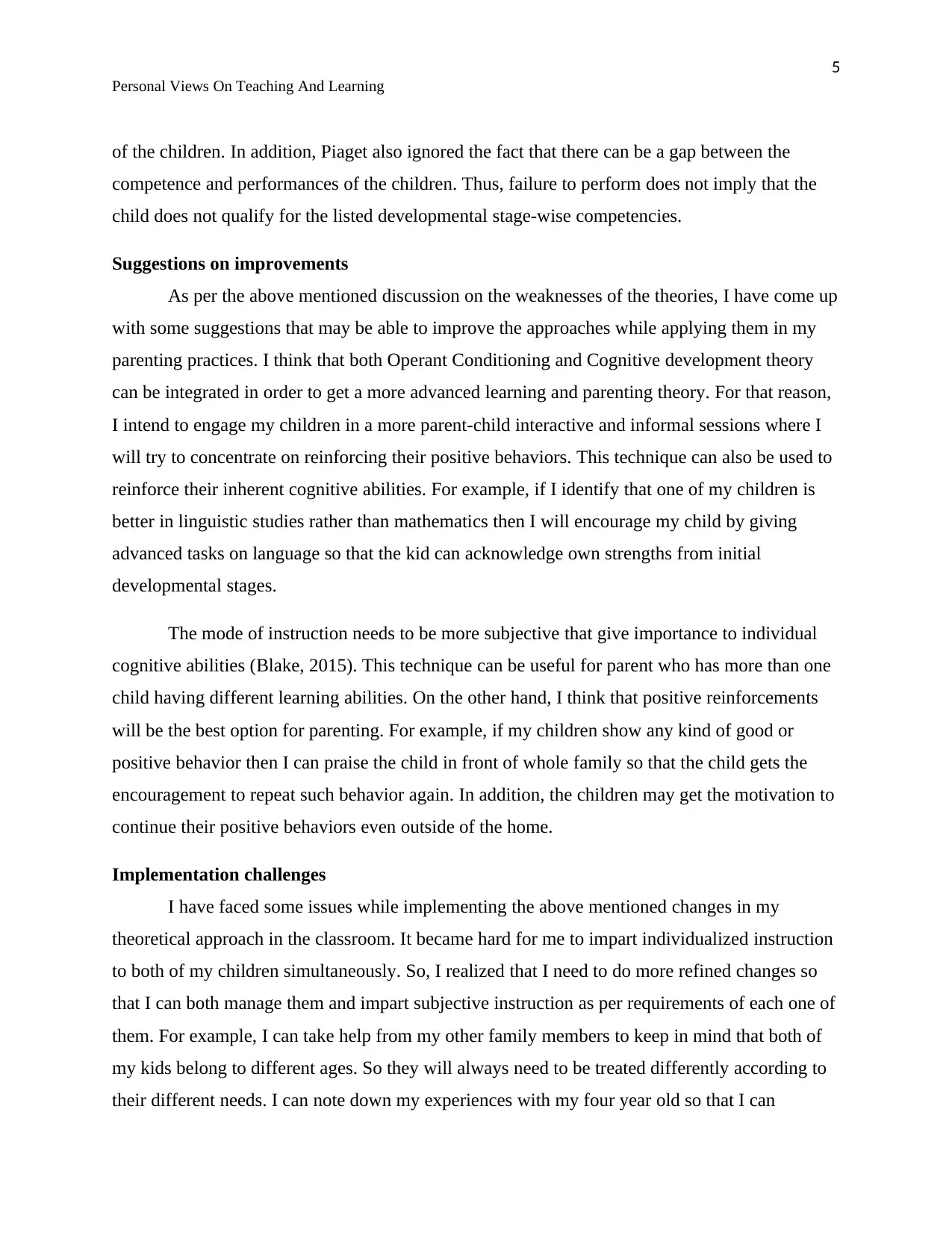
5
Personal Views On Teaching And Learning
of the children. In addition, Piaget also ignored the fact that there can be a gap between the
competence and performances of the children. Thus, failure to perform does not imply that the
child does not qualify for the listed developmental stage-wise competencies.
Suggestions on improvements
As per the above mentioned discussion on the weaknesses of the theories, I have come up
with some suggestions that may be able to improve the approaches while applying them in my
parenting practices. I think that both Operant Conditioning and Cognitive development theory
can be integrated in order to get a more advanced learning and parenting theory. For that reason,
I intend to engage my children in a more parent-child interactive and informal sessions where I
will try to concentrate on reinforcing their positive behaviors. This technique can also be used to
reinforce their inherent cognitive abilities. For example, if I identify that one of my children is
better in linguistic studies rather than mathematics then I will encourage my child by giving
advanced tasks on language so that the kid can acknowledge own strengths from initial
developmental stages.
The mode of instruction needs to be more subjective that give importance to individual
cognitive abilities (Blake, 2015). This technique can be useful for parent who has more than one
child having different learning abilities. On the other hand, I think that positive reinforcements
will be the best option for parenting. For example, if my children show any kind of good or
positive behavior then I can praise the child in front of whole family so that the child gets the
encouragement to repeat such behavior again. In addition, the children may get the motivation to
continue their positive behaviors even outside of the home.
Implementation challenges
I have faced some issues while implementing the above mentioned changes in my
theoretical approach in the classroom. It became hard for me to impart individualized instruction
to both of my children simultaneously. So, I realized that I need to do more refined changes so
that I can both manage them and impart subjective instruction as per requirements of each one of
them. For example, I can take help from my other family members to keep in mind that both of
my kids belong to different ages. So they will always need to be treated differently according to
their different needs. I can note down my experiences with my four year old so that I can
Personal Views On Teaching And Learning
of the children. In addition, Piaget also ignored the fact that there can be a gap between the
competence and performances of the children. Thus, failure to perform does not imply that the
child does not qualify for the listed developmental stage-wise competencies.
Suggestions on improvements
As per the above mentioned discussion on the weaknesses of the theories, I have come up
with some suggestions that may be able to improve the approaches while applying them in my
parenting practices. I think that both Operant Conditioning and Cognitive development theory
can be integrated in order to get a more advanced learning and parenting theory. For that reason,
I intend to engage my children in a more parent-child interactive and informal sessions where I
will try to concentrate on reinforcing their positive behaviors. This technique can also be used to
reinforce their inherent cognitive abilities. For example, if I identify that one of my children is
better in linguistic studies rather than mathematics then I will encourage my child by giving
advanced tasks on language so that the kid can acknowledge own strengths from initial
developmental stages.
The mode of instruction needs to be more subjective that give importance to individual
cognitive abilities (Blake, 2015). This technique can be useful for parent who has more than one
child having different learning abilities. On the other hand, I think that positive reinforcements
will be the best option for parenting. For example, if my children show any kind of good or
positive behavior then I can praise the child in front of whole family so that the child gets the
encouragement to repeat such behavior again. In addition, the children may get the motivation to
continue their positive behaviors even outside of the home.
Implementation challenges
I have faced some issues while implementing the above mentioned changes in my
theoretical approach in the classroom. It became hard for me to impart individualized instruction
to both of my children simultaneously. So, I realized that I need to do more refined changes so
that I can both manage them and impart subjective instruction as per requirements of each one of
them. For example, I can take help from my other family members to keep in mind that both of
my kids belong to different ages. So they will always need to be treated differently according to
their different needs. I can note down my experiences with my four year old so that I can
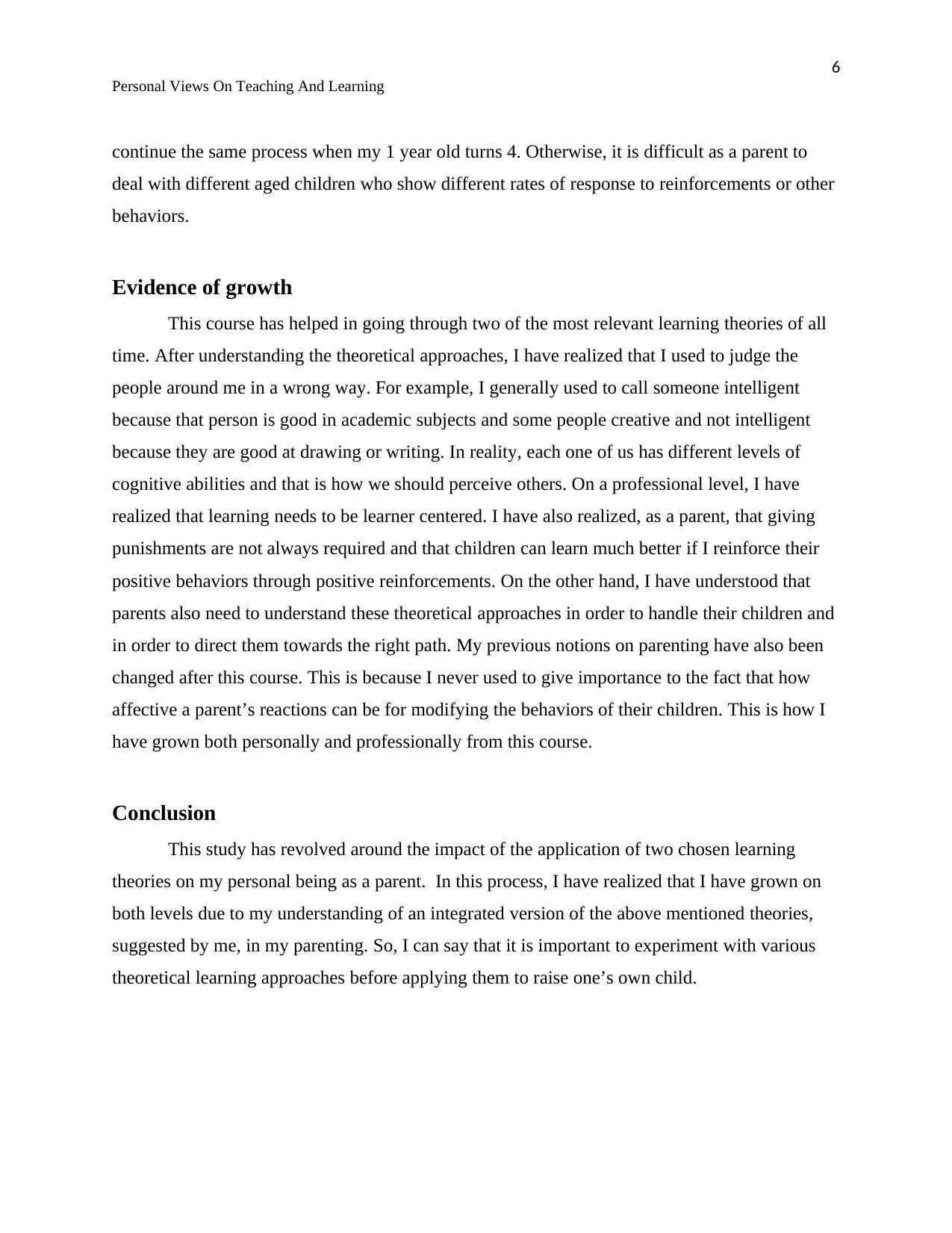
6
Personal Views On Teaching And Learning
continue the same process when my 1 year old turns 4. Otherwise, it is difficult as a parent to
deal with different aged children who show different rates of response to reinforcements or other
behaviors.
Evidence of growth
This course has helped in going through two of the most relevant learning theories of all
time. After understanding the theoretical approaches, I have realized that I used to judge the
people around me in a wrong way. For example, I generally used to call someone intelligent
because that person is good in academic subjects and some people creative and not intelligent
because they are good at drawing or writing. In reality, each one of us has different levels of
cognitive abilities and that is how we should perceive others. On a professional level, I have
realized that learning needs to be learner centered. I have also realized, as a parent, that giving
punishments are not always required and that children can learn much better if I reinforce their
positive behaviors through positive reinforcements. On the other hand, I have understood that
parents also need to understand these theoretical approaches in order to handle their children and
in order to direct them towards the right path. My previous notions on parenting have also been
changed after this course. This is because I never used to give importance to the fact that how
affective a parent’s reactions can be for modifying the behaviors of their children. This is how I
have grown both personally and professionally from this course.
Conclusion
This study has revolved around the impact of the application of two chosen learning
theories on my personal being as a parent. In this process, I have realized that I have grown on
both levels due to my understanding of an integrated version of the above mentioned theories,
suggested by me, in my parenting. So, I can say that it is important to experiment with various
theoretical learning approaches before applying them to raise one’s own child.
Personal Views On Teaching And Learning
continue the same process when my 1 year old turns 4. Otherwise, it is difficult as a parent to
deal with different aged children who show different rates of response to reinforcements or other
behaviors.
Evidence of growth
This course has helped in going through two of the most relevant learning theories of all
time. After understanding the theoretical approaches, I have realized that I used to judge the
people around me in a wrong way. For example, I generally used to call someone intelligent
because that person is good in academic subjects and some people creative and not intelligent
because they are good at drawing or writing. In reality, each one of us has different levels of
cognitive abilities and that is how we should perceive others. On a professional level, I have
realized that learning needs to be learner centered. I have also realized, as a parent, that giving
punishments are not always required and that children can learn much better if I reinforce their
positive behaviors through positive reinforcements. On the other hand, I have understood that
parents also need to understand these theoretical approaches in order to handle their children and
in order to direct them towards the right path. My previous notions on parenting have also been
changed after this course. This is because I never used to give importance to the fact that how
affective a parent’s reactions can be for modifying the behaviors of their children. This is how I
have grown both personally and professionally from this course.
Conclusion
This study has revolved around the impact of the application of two chosen learning
theories on my personal being as a parent. In this process, I have realized that I have grown on
both levels due to my understanding of an integrated version of the above mentioned theories,
suggested by me, in my parenting. So, I can say that it is important to experiment with various
theoretical learning approaches before applying them to raise one’s own child.
Paraphrase This Document
Need a fresh take? Get an instant paraphrase of this document with our AI Paraphraser
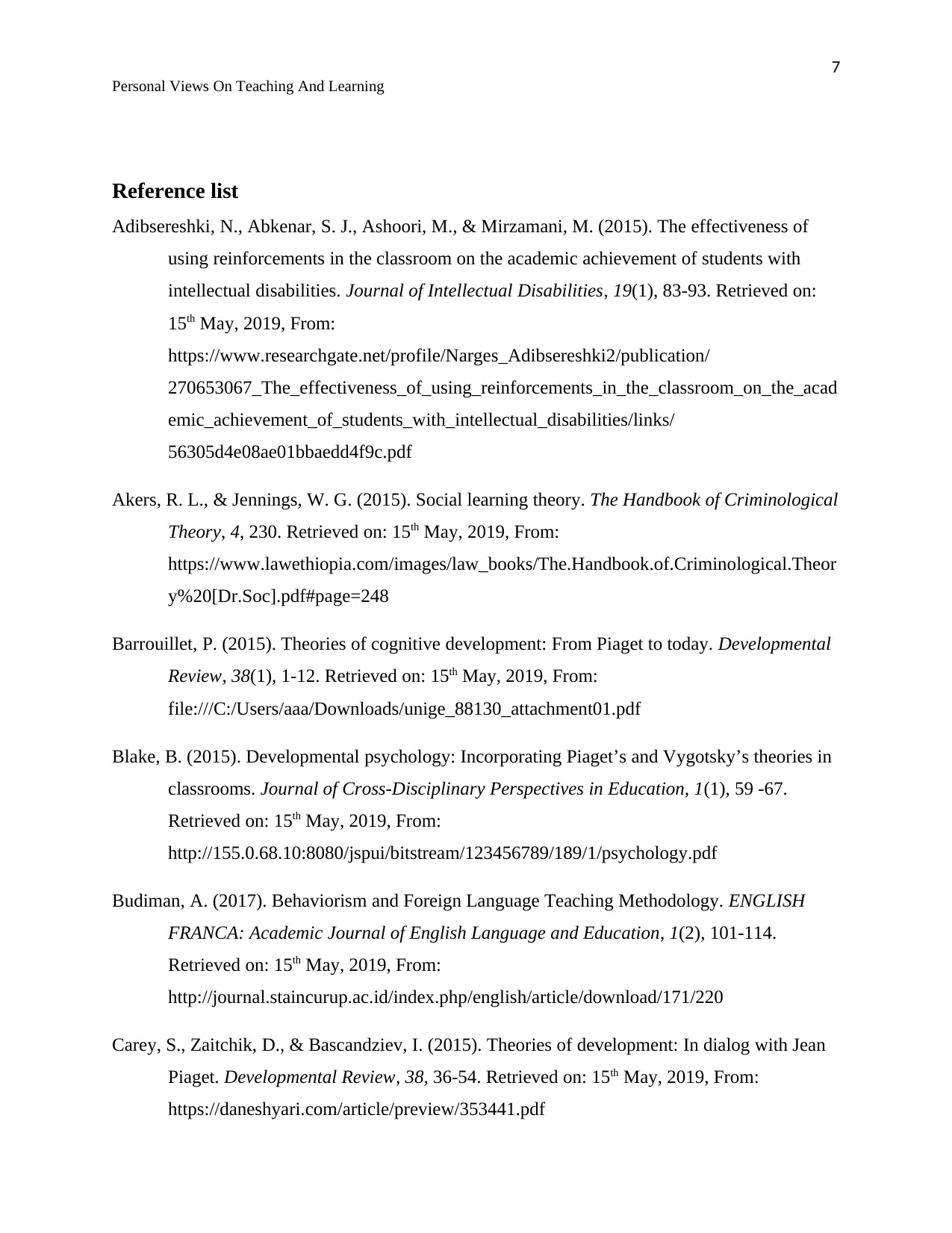
7
Personal Views On Teaching And Learning
Reference list
Adibsereshki, N., Abkenar, S. J., Ashoori, M., & Mirzamani, M. (2015). The effectiveness of
using reinforcements in the classroom on the academic achievement of students with
intellectual disabilities. Journal of Intellectual Disabilities, 19(1), 83-93. Retrieved on:
15th May, 2019, From:
https://www.researchgate.net/profile/Narges_Adibsereshki2/publication/
270653067_The_effectiveness_of_using_reinforcements_in_the_classroom_on_the_acad
emic_achievement_of_students_with_intellectual_disabilities/links/
56305d4e08ae01bbaedd4f9c.pdf
Akers, R. L., & Jennings, W. G. (2015). Social learning theory. The Handbook of Criminological
Theory, 4, 230. Retrieved on: 15th May, 2019, From:
https://www.lawethiopia.com/images/law_books/The.Handbook.of.Criminological.Theor
y%20[Dr.Soc].pdf#page=248
Barrouillet, P. (2015). Theories of cognitive development: From Piaget to today. Developmental
Review, 38(1), 1-12. Retrieved on: 15th May, 2019, From:
file:///C:/Users/aaa/Downloads/unige_88130_attachment01.pdf
Blake, B. (2015). Developmental psychology: Incorporating Piaget’s and Vygotsky’s theories in
classrooms. Journal of Cross-Disciplinary Perspectives in Education, 1(1), 59 -67.
Retrieved on: 15th May, 2019, From:
http://155.0.68.10:8080/jspui/bitstream/123456789/189/1/psychology.pdf
Budiman, A. (2017). Behaviorism and Foreign Language Teaching Methodology. ENGLISH
FRANCA: Academic Journal of English Language and Education, 1(2), 101-114.
Retrieved on: 15th May, 2019, From:
http://journal.staincurup.ac.id/index.php/english/article/download/171/220
Carey, S., Zaitchik, D., & Bascandziev, I. (2015). Theories of development: In dialog with Jean
Piaget. Developmental Review, 38, 36-54. Retrieved on: 15th May, 2019, From:
https://daneshyari.com/article/preview/353441.pdf
Personal Views On Teaching And Learning
Reference list
Adibsereshki, N., Abkenar, S. J., Ashoori, M., & Mirzamani, M. (2015). The effectiveness of
using reinforcements in the classroom on the academic achievement of students with
intellectual disabilities. Journal of Intellectual Disabilities, 19(1), 83-93. Retrieved on:
15th May, 2019, From:
https://www.researchgate.net/profile/Narges_Adibsereshki2/publication/
270653067_The_effectiveness_of_using_reinforcements_in_the_classroom_on_the_acad
emic_achievement_of_students_with_intellectual_disabilities/links/
56305d4e08ae01bbaedd4f9c.pdf
Akers, R. L., & Jennings, W. G. (2015). Social learning theory. The Handbook of Criminological
Theory, 4, 230. Retrieved on: 15th May, 2019, From:
https://www.lawethiopia.com/images/law_books/The.Handbook.of.Criminological.Theor
y%20[Dr.Soc].pdf#page=248
Barrouillet, P. (2015). Theories of cognitive development: From Piaget to today. Developmental
Review, 38(1), 1-12. Retrieved on: 15th May, 2019, From:
file:///C:/Users/aaa/Downloads/unige_88130_attachment01.pdf
Blake, B. (2015). Developmental psychology: Incorporating Piaget’s and Vygotsky’s theories in
classrooms. Journal of Cross-Disciplinary Perspectives in Education, 1(1), 59 -67.
Retrieved on: 15th May, 2019, From:
http://155.0.68.10:8080/jspui/bitstream/123456789/189/1/psychology.pdf
Budiman, A. (2017). Behaviorism and Foreign Language Teaching Methodology. ENGLISH
FRANCA: Academic Journal of English Language and Education, 1(2), 101-114.
Retrieved on: 15th May, 2019, From:
http://journal.staincurup.ac.id/index.php/english/article/download/171/220
Carey, S., Zaitchik, D., & Bascandziev, I. (2015). Theories of development: In dialog with Jean
Piaget. Developmental Review, 38, 36-54. Retrieved on: 15th May, 2019, From:
https://daneshyari.com/article/preview/353441.pdf
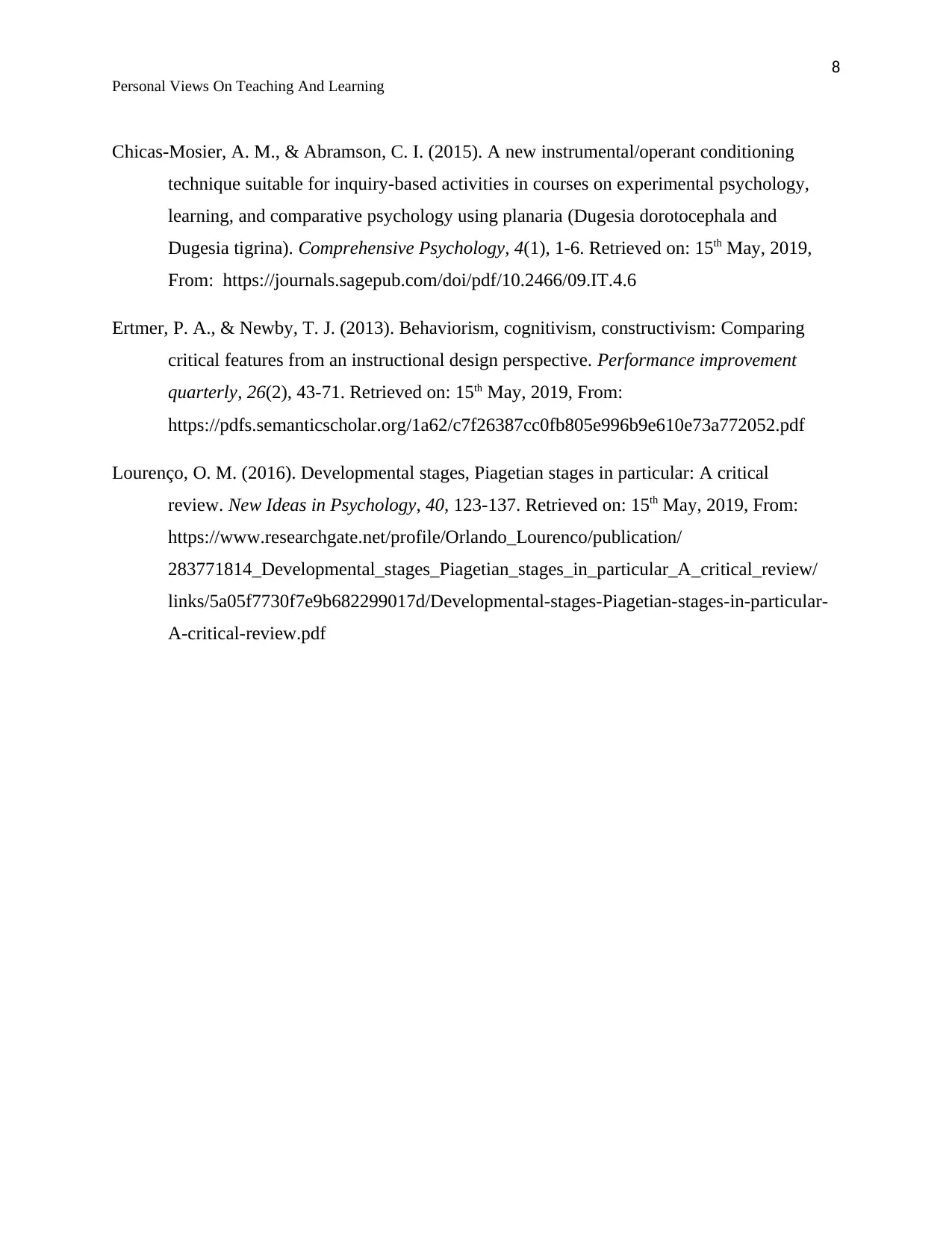
8
Personal Views On Teaching And Learning
Chicas-Mosier, A. M., & Abramson, C. I. (2015). A new instrumental/operant conditioning
technique suitable for inquiry-based activities in courses on experimental psychology,
learning, and comparative psychology using planaria (Dugesia dorotocephala and
Dugesia tigrina). Comprehensive Psychology, 4(1), 1-6. Retrieved on: 15th May, 2019,
From: https://journals.sagepub.com/doi/pdf/10.2466/09.IT.4.6
Ertmer, P. A., & Newby, T. J. (2013). Behaviorism, cognitivism, constructivism: Comparing
critical features from an instructional design perspective. Performance improvement
quarterly, 26(2), 43-71. Retrieved on: 15th May, 2019, From:
https://pdfs.semanticscholar.org/1a62/c7f26387cc0fb805e996b9e610e73a772052.pdf
Lourenço, O. M. (2016). Developmental stages, Piagetian stages in particular: A critical
review. New Ideas in Psychology, 40, 123-137. Retrieved on: 15th May, 2019, From:
https://www.researchgate.net/profile/Orlando_Lourenco/publication/
283771814_Developmental_stages_Piagetian_stages_in_particular_A_critical_review/
links/5a05f7730f7e9b682299017d/Developmental-stages-Piagetian-stages-in-particular-
A-critical-review.pdf
Personal Views On Teaching And Learning
Chicas-Mosier, A. M., & Abramson, C. I. (2015). A new instrumental/operant conditioning
technique suitable for inquiry-based activities in courses on experimental psychology,
learning, and comparative psychology using planaria (Dugesia dorotocephala and
Dugesia tigrina). Comprehensive Psychology, 4(1), 1-6. Retrieved on: 15th May, 2019,
From: https://journals.sagepub.com/doi/pdf/10.2466/09.IT.4.6
Ertmer, P. A., & Newby, T. J. (2013). Behaviorism, cognitivism, constructivism: Comparing
critical features from an instructional design perspective. Performance improvement
quarterly, 26(2), 43-71. Retrieved on: 15th May, 2019, From:
https://pdfs.semanticscholar.org/1a62/c7f26387cc0fb805e996b9e610e73a772052.pdf
Lourenço, O. M. (2016). Developmental stages, Piagetian stages in particular: A critical
review. New Ideas in Psychology, 40, 123-137. Retrieved on: 15th May, 2019, From:
https://www.researchgate.net/profile/Orlando_Lourenco/publication/
283771814_Developmental_stages_Piagetian_stages_in_particular_A_critical_review/
links/5a05f7730f7e9b682299017d/Developmental-stages-Piagetian-stages-in-particular-
A-critical-review.pdf
1 out of 9
Related Documents
Your All-in-One AI-Powered Toolkit for Academic Success.
+13062052269
info@desklib.com
Available 24*7 on WhatsApp / Email
![[object Object]](/_next/static/media/star-bottom.7253800d.svg)
Unlock your academic potential
© 2024 | Zucol Services PVT LTD | All rights reserved.





